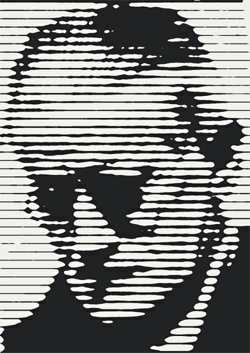The Dismissal of Mulligan
Lubber
Stephen has negotiated his own resolution to the Henriad’s question of fatherhood. Now that he has concluded this part of the hero’s journey, he no longer requires his Falstaffian companion. As he leaves the library his thoughts return to his decision to leave Mulligan. The descriptions are filled with words for Mulligan’s "jestering." Yet there is one word that rings a flat note: "lubber":
–We shall see you tonight, John Eglinton said. Notre ami Moore says Malachi Mulligan must be there.
Buck Mulligan flaunted his slip and panama.
–Monsieur Moore, he said, lecturer on French letters to the youth of Ireland. I’ll be there. Come, Kinch, the bards must drink. Can you walk straight?
Laughing, he . . .
Swill till eleven. Irish nights entertainment.
Lubber . . .
Stephen followed a lubber . . .
One day in the national library we had a discussion. Shakes. After. His lub back: I followed. I gall his kibe.
Stephen, greeting, then all amort, followed a lubber jester, a wellkempt head, newbarbered, out of the vaulted cell into a shattering daylight of no thought. (U.9.1098-1113)
"Lubber" does not have a directly foolish connotation. It is literally a clod, a clumsy person with specific reference to seamanship, as in "landlubber." It is in fact an allusion to a scene in Henry IV, Part 2, where Falstaff first begins to be called to account. It is the same scene that "I’ll tickle his catastrophe" (Henry IV, Part 2, II.i.66) comes from. Mistress Quickly, in her literal-minded style, is attempting to explain Falstaff’s movements for the day so that the watch may apprehend him:
MISTRESS QUICKLY: I am undone by his going; I warrant you, he’s an infinitive thing upon my score. Good Master Fang, hold him sure: good Master Snare, let him not ‘scape. A’ comes continuantly to Pie-corner–saving your manhoods–to buy a saddle; and he is indited to dinner to the Lubber’s-head in Lumbert street, to Master Smooth’s the silkman: I pray ye, since my exion is entered and my case so openly known to the world, let him be brought in to his answer. (Henry IV, Part 2, II.i.20-35, Italics Added)
It is the invitation to Moore’s and thoughts of the evening that set off the lubber association in Stephen’s mind and his thoughts about when to take his leave of Mulligan. As with the Shakespearean scene, this is not the end, but it is the beginning of the end. Stephen no longer needs his Falstaff.
A Table of Rudely-Green Fields
The final dismissal of Mulligan as Falstaff occurs much later. As with Falstaff, it occurs long after Mulligan’s last appearance. Falstaff dies offstage, and his demise is reported to the audience by Mistress Quickly: "I knew there was but one way; for his nose was as sharp as a pen, and a table of green fields" (Henry V, II.iii.17-19) This has been a long-standing crux for Shakespearean scholarship, the folio reading having been amended to "a’ babled of green fields." Fleissner (1983) has shown the original to be quite satisfactory if we understand "table" to be used in the manner of "tableau" and the description to have come from Galen’s description of "Facies Hippocratica." Either reading proves appropriate, though, to the last mention of Mulligan in Ulysses. We only hear two examples from Mulligan of his scheme of art colors. The first is in the early pages of the book as he examines Stephen’s handkerchief: "– The bard’s noserag! A new art colour for our Irish poets: snotgreen. You can almost taste it, can’t you?" (U.1.73-74). The second is in the furious final pages of "Oxen of the Sun" as Mulligan regurgitates various phrases from earlier in the day (words of Mulligan indicated by brackets):
Mulligan! Abaft there! Shove ahead. Keep a watch on the clock. Chuckingout time. Mullee! What’s on you? [Ma mère m’a mariée. British Beatitudes! Retamplatan digidi boumboum. Ayes have it. To be printed and bound at the Druiddrum press by two designing females. Calf covers of pissedon green. Last word in art shades. Most beautiful book come out of Ireland my time.] (U.14.1453-1456, Brackets, Bold Added)
We learn from Bloom, however, that these particular shades are in fact part of a larger scheme that Mulligan reported in a conversation not recorded by the narrative. As Bloom is recovering from cracking his head in the dark he recalls the offstage experience of Mulligan’s "table of green fields":
Dr Malachi Mulligan’s scheme of colour containing the gradation of green: with pleasure, repeating the words and antecedent act and perceiving through various channels of internal sensibility the consequent and concomitant tepid pleasant diffusion of gradual discolouration. (U.17.1315-1319)






